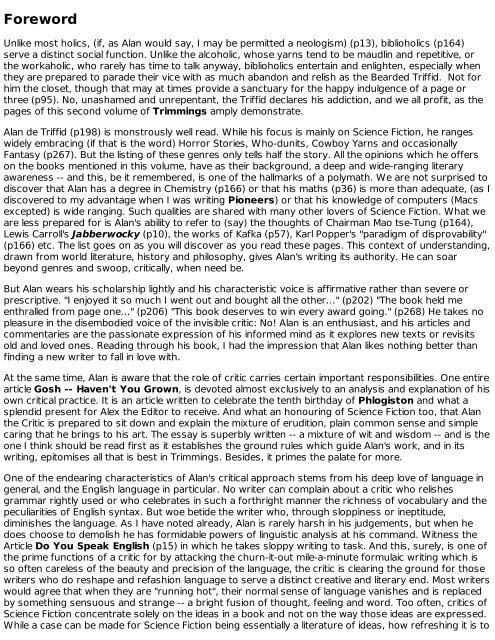Triffids Beard 2 - The Bearded Triffid
Triffids Beard 2 - The Bearded Triffid
Triffids Beard 2 - The Bearded Triffid
You also want an ePaper? Increase the reach of your titles
YUMPU automatically turns print PDFs into web optimized ePapers that Google loves.
Foreword<br />
Unlike most holics, (if, as Alan would say, I may be permitted a neologism) (p13), biblioholics (p164)<br />
serve a distinct social function. Unlike the alcoholic, whose yarns tend to be maudlin and repetitive, or<br />
the workaholic, who rarely has time to talk anyway, biblioholics entertain and enlighten, especially when<br />
they are prepared to parade their vice with as much abandon and relish as the <strong>Beard</strong>ed <strong>Triffid</strong>. Not for<br />
him the closet, though that may at times provide a sanctuary for the happy indulgence of a page or<br />
three (p95). No, unashamed and unrepentant, the <strong>Triffid</strong> declares his addiction, and we all profit, as the<br />
pages of this second volume of Trimmings amply demonstrate.<br />
Alan de <strong>Triffid</strong> (p198) is monstrously well read. While his focus is mainly on Science Fiction, he ranges<br />
widely embracing (if that is the word) Horror Stories, Who-dunits, Cowboy Yarns and occasionally<br />
Fantasy (p267). But the listing of these genres only tells half the story. All the opinions which he offers<br />
on the books mentioned in this volume, have as their background, a deep and wide-ranging literary<br />
awareness -- and this, be it remembered, is one of the hallmarks of a polymath. We are not surprised to<br />
discover that Alan has a degree in Chemistry (p166) or that his maths (p36) is more than adequate, (as I<br />
discovered to my advantage when I was writing Pioneers) or that his knowledge of computers (Macs<br />
excepted) is wide ranging. Such qualities are shared with many other lovers of Science Fiction. What we<br />
are less prepared for is Alan's ability to refer to (say) the thoughts of Chairman Mao tse-Tung (p164),<br />
Lewis Carroll's Jabberwocky (p10), the works of Kafka (p57), Karl Popper's "paradigm of disprovability"<br />
(p166) etc. <strong>The</strong> list goes on as you will discover as you read these pages. This context of understanding,<br />
drawn from world literature, history and philosophy, gives Alan's writing its authority. He can soar<br />
beyond genres and swoop, critically, when need be.<br />
But Alan wears his scholarship lightly and his characteristic voice is affirmative rather than severe or<br />
prescriptive. "I enjoyed it so much I went out and bought all the other…" (p202) "<strong>The</strong> book held me<br />
enthralled from page one…" (p206) "This book deserves to win every award going." (p268) He takes no<br />
pleasure in the disembodied voice of the invisible critic: No! Alan is an enthusiast, and his articles and<br />
commentaries are the passionate expression of his informed mind as it explores new texts or revisits<br />
old and loved ones. Reading through his book, I had the impression that Alan likes nothing better than<br />
finding a new writer to fall in love with.<br />
At the same time, Alan is aware that the role of critic carries certain important responsibilities. One entire<br />
article Gosh -- Haven't You Grown, is devoted almost exclusively to an analysis and explanation of his<br />
own critical practice. It is an article written to celebrate the tenth birthday of Phlogiston and what a<br />
splendid present for Alex the Editor to receive. And what an honouring of Science Fiction too, that Alan<br />
the Critic is prepared to sit down and explain the mixture of erudition, plain common sense and simple<br />
caring that he brings to his art. <strong>The</strong> essay is superbly written -- a mixture of wit and wisdom -- and is the<br />
one I think should be read first as it establishes the ground rules which guide Alan's work, and in its<br />
writing, epitomises all that is best in Trimmings. Besides, it primes the palate for more.<br />
One of the endearing characteristics of Alan's critical approach stems from his deep love of language in<br />
general, and the English language in particular. No writer can complain about a critic who relishes<br />
grammar rightly used or who celebrates in such a forthright manner the richness of vocabulary and the<br />
peculiarities of English syntax. But woe betide the writer who, through sloppiness or ineptitude,<br />
diminishes the language. As I have noted already, Alan is rarely harsh in his judgements, but when he<br />
does choose to demolish he has formidable powers of linguistic analysis at his command. Witness the<br />
Article Do You Speak English (p15) in which he takes sloppy writing to task. And this, surely, is one of<br />
the prime functions of a critic for by attacking the churn-it-out mile-a-minute formulaic writing which is<br />
so often careless of the beauty and precision of the language, the critic is clearing the ground for those<br />
writers who do reshape and refashion language to serve a distinct creative and literary end. Most writers<br />
would agree that when they are "running hot", their normal sense of language vanishes and is replaced<br />
by something sensuous and strange -- a bright fusion of thought, feeling and word. Too often, critics of<br />
Science Fiction concentrate solely on the ideas in a book and not on the way those ideas are expressed.<br />
While a case can be made for Science Fiction being essentially a literature of ideas, how refreshing it is to


